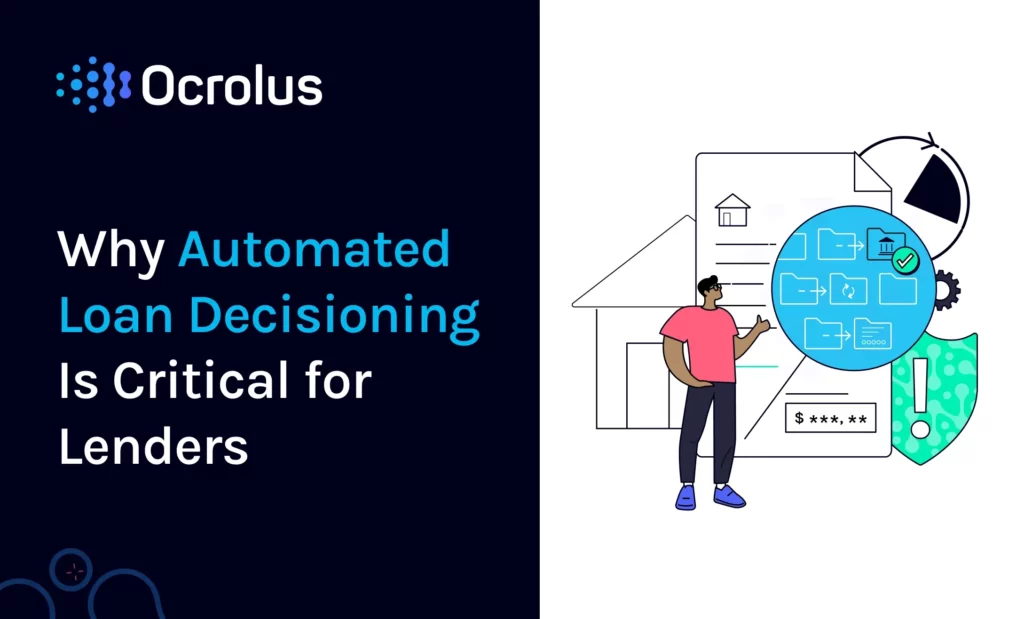This website uses cookies so that we can provide you with the best user experience possible. Cookie information is stored in your browser and performs functions such as recognising you when you return to our website and helping our team to understand which sections of the website you find most interesting and useful.
Why Automated Loan Decisioning Is Critical for Lenders

Loan automation is becoming a must-have for financial institutions as they replace time-consuming, manual processing with faster and more accurate technology.
According to International Data Corp. (IDC), loan origination automation was the leading investment for the banking industry in 2022. Lending automation enables financial institutions to replace inefficient manual processes with AI-powered technology that can review documents with over 99% accuracy. Looking ahead, IDC predicts that financial institutions will continue to prioritize loan process automation investments that improve loan decision-making, reduce fraud, and improve customer experiences.
What is automated loan decisioning?
Automated loan decisioning uses technology to classify, capture, detect, and analyze borrower data. Business process automation (BPA) can be integrated with human decision-making in order to optimize document management. This hybrid technology combines the power and speed of AI with human analysis and insight. This streamlines the lending process by simplifying everything from capturing borrower data to making loan decisions. Automated review facilitates a faster and more accurate loan approval process by reducing overhead, eliminating paper forms, and improving underwriting accuracy.
Automation optimizes the entire loan process, from customer management to due diligence. As a report from Moody’s Analytics noted, automation mitigates the inconsistency and delays of manually collecting and analyzing a borrower’s financial data. Financial institutions evaluating automation technology solutions should look for intelligent document processing and analysis solutions that can be fully integrated into their credit evaluation and underwriting workflows.
In addition to streamlining loan decision workflows, automation is invaluable in helping analysts and underwriters accurately and efficiently analyze a borrower’s financial statements and creditworthiness. Optical character recognition (OCR) and machine learning can also fully integrate a borrower’s balance sheet data, income/expense reports, cash flow, and tax forms into a common format for analysis.
What parts of the loan approval process can and should be automated?
Every step of the loan approval process can and should be automated. Manual processing is time-consuming and prone to human error. By contrast, automation facilitates faster loans, reduces repayment default risk, and lowers operating costs. Replacing manual, paper-based underwriting practices improves auditability, accuracy, and processing time. In fact, Moody’s recommends that every step of the loan approval process be automated.
Automation technology enables lenders to eliminate processing redundancy and reduce human error — enabling quicker and more accurate loan decisions. Automated processing also improves the user experience by streamlining the application process and accelerating loan approvals.
What are the benefits of automated loan decision-making?
Intelligent document processing empowers fintechs to improve accuracy, operational efficiency, processing, and decision-making. For example, lenders can use automation technology to extract and analyze borrower data from loan documents, assess credit risk, verify income, identify fraud, and, ultimately, make smarter loan underwriting decisions.
The benefits of automated loan-decision-making include:
- Elimination of costly manual processes
- Increased efficiency
- Faster processing
- More accurate risk assessment
- Reduced risk
- Better underwriting
- Fewer defaults
Fraud detection, in particular, is one of the ways in which automation helps reduce risk for fintechs. But automation also ensures accurate analysis of borrower data. Kapitus, for example, has replaced its legacy manual loan decision process with data-driven technology that supports faster and more precise lending decisions.
Why automated loan decision-making is critical for lenders and financial institutions
Higher interest rates and recessionary anxiety have created pressure on mortgage and consumer lenders to reduce costs and streamline the loan decision-making process. As IDC noted, fintechs need automation in order to improve operational efficiencies, optimize loan throughput and revenue, and enhance customer service.
Ocrolus has developed technology built by underwriters for underwriters. This includes automated analysis of loan documents and the ability to make income calculations for multiple types of borrowers. Compliance is embedded into loan approval workflows, which increases fraud detection and decreases risk.
Moreover, Ocrolus has developed unparalleled efficiency with human-in-the-loop document processing. Human-in-the-loop processing enhances document classification, capture, detection, and analysis. All four of these workflow steps are essential for an automated loan decision-making system.
Classification: The path to a loan decision starts with document classification. Ocrolus technology combines machine learning technology with human validation to ensure precise data capture and classification. Best-in-class accuracy eliminates manual processing and improves efficiency.
Capture: Intelligent document processing enables lenders to extract and structure data using computer vision and human validation. This increases accuracy, improves processing speed, enables scalability, and bolsters compliance.
Detection: Ocrolus technology includes file tampering detection and algorithmic validation to identify suspicious activity and potential fraud. Machine learning algorithms also provide for continuous improvement. This gives lenders the ability to mitigate risk even as loan volume increases.
Analysis: Good underwriting requires accurate insights into a loan applicant’s cash flow and income. Ocrolus technology enables normalized data capture that facilitates cash flow calculations and the evaluation of income metrics. The result is risk modeling that provides a more accurate assessment of a borrower’s ability to repay a loan. Using sophisticated automation and machine learning technology ultimately enables fintechs to make more reliable lending decisions.
Underwriters can benefit from automation in several ways, including making faster and more accurate loan decisions, accelerating loan processing, and reducing risk. Automation also gives mortgage, business, and consumer lenders precise analysis of borrower data on which to base their decisions. Ocrolus easily integrates with existing infrastructure and empowers lenders to manage risk and make smarter lending decisions.
Schedule your demo to learn more about how automated loan decision software can optimize your ability to analyze data and make better lending decisions.





